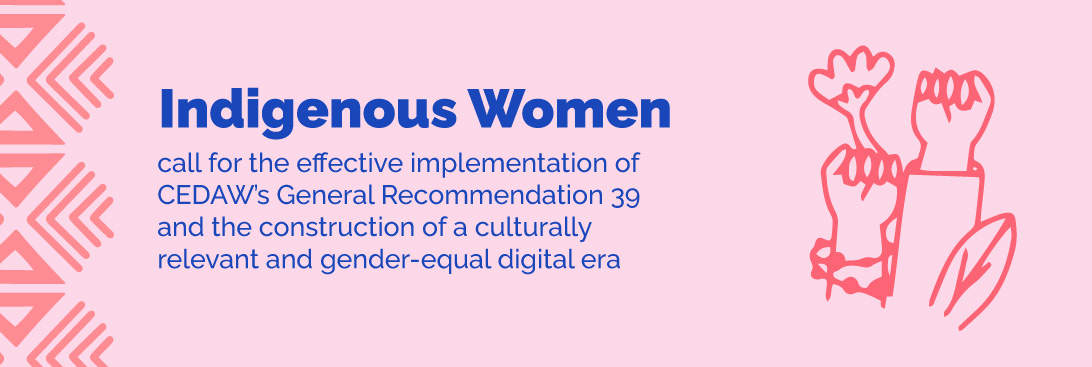
March 6, 2023.- To guarantee that the principles of inclusion and intersectionality guide technological innovation and reduce discrimination and gender inequalities, within the framework of the 67th session of the Commission on the Legal and Social Condition of Women (CSW67 ) at the UN, the Coordination Meeting of Indigenous Women organized by the International Forum of Indigenous Women (FIMI) was held in parallel.
CSW67 is the main international body dedicated exclusively to the promotion of gender equality and the development of international norms that promote the empowerment of women. This year will also be a fundamental space to amplify our voices and fight for the effective implementation of CEDAW General Recommendation Number 39 (RG39), a binding international instrument for the protection of the individual and collective rights of Indigenous Girls and Women around the world. .
In the event we gather leaders from different regions, who reflect on our objectives, achievements, gaps and pending challenges in the promotion and protection of our rights. During the reflection, we discussed the obligation that the States Parties assumed to develop and implement comprehensive policies that effectively protect the rights and principles of substantive equality and non-discrimination, and we agreed on the urgency for Indigenous Girls and Women to participate in the construction of a digital age that narrows gender gaps and promotes inclusive technological innovation ecosystems that eliminate violence.
The gathering began with a spiritual ceremony led by Malia Nobrega-Olivera, an Indian from the Hanapēpē Valley, Kona, Kaua'i in Hawaii, Director of Strategic Partnerships and Community Engagement for the School of Hawaiian Knowledge, and the Loli Aniau, Makaala Aniau program. (THE MA).
During her participation, Tarcila Rivera Zea, Quechua from Peru, President of FIMI, gave a warm welcome and recalled that the origin of the International Forum of Indigenous Women, made up of organizations from seven socio-cultural regions, is based on meetings that we have maintained since 1995 during the signing of the Beijing Declaration of Indigenous Women, "laying the foundations for our claims as indigenous people and as women," she said.
Today, more than 30 years later, the articles with which we then "defined our rights and positions as Indigenous Women, are still more valid than ever to recover, share, reflect and continue projecting our aspirations globally," said Tarcila Rivera Zea.
In a video broadcast during the event, Lucy Mulenkei, Masai from Kenya, Co-Founder and Vice President of FIMI, said that the meeting will be important because “we will hear diverse voices that will inform our experience working on issues that impact Indigenous Women and Indigenous Peoples in general".
Teresa Zapeta Mendoza, Maya K'iche from Guatemala, Director of FIMI, recognized the strategic alliances that have been made over time to achieve common historical purposes among Indigenous Women from different regions, despite violence and inequalities. "This year, in addition to discussing together the challenges we face in the digital age to achieve gender equality and the empowerment of all women and girls, we are celebrating the approval of RG39, which is a bridge to ensure our rights."
“The General Recommendation is a historical fact that not only favors Indigenous Women and Girls, but also the human rights of Indigenous Peoples around the world,” she insisted.
The participating sisters recognized that governments must assume responsibilities and commitments in the fight against violence, and we named some demands and actions to move forward with civil society and other key actors to implement technological solutions that allow empowerment and the transformation of roles and social norms. traditional; promote the access that Indigenous Women have to digital technologies in rural and non-rural areas to reduce inequalities; strengthen, through digital education, feeling, living and thinking as women belonging to Original Peoples; eliminate technological gaps to guarantee the rights of Indigenous Women and Girls with disabilities so that they know the international instruments that protect them; understand that the installation of a digital infrastructure, especially in rural areas, is not the solution to achieve connectivity for all because it is necessary, they said, to learn what limits women in managing technology and generate adoption and use strategies close to users and their communities; Generate and promote access to information on digital violence or cybercrimes against young people and Indigenous Women.
Finally, Teresa reiterated that the articulation of women has been essential for the adoption of CEDAW General Recommendation 39, and assured that this is a unique opportunity to integrate the collective priorities, worldview, experiences and lessons shared by the women. Indigenous Women to achieve transformative change and guarantee the preservation of different cultures and our individual and collective identities.




